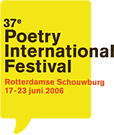Poet
|
Uday Prakash 1952-... country: India language: Hindi |
is a famous media personality in his own country, well-known as a poet, journalist, writer and film director. He has written scripts for films and television, short stories, essays and three books of poems. Prakesh’s verse is versatile in its use of language and reflects a strong social commitment. Uday Prakash (India, 1952) was born into a family of large landowners in a tribal environment. He left his parents’ house at an early age to begin a difficult period of acclimatization in a big city environment. He worked as proofreader in a print shop where he also slept at night. Today, after years of teaching and as an ‘independent literary entrepreneur’, he has several collections of stories, three books of poetry, many essays, translations and documentary films to his name. He has received many awards for his work. From his background he developed his themes. Tribal life, he says, though ‘premodern’ and ‘prescientific’, is more sensitive, more reliable and more honest than the hectic, competitive life of the cities. He uses descriptions of tribal life as ‘critique’ of modern existence. The ‘small life’ of the ‘common man’ in the city does not cease to move him, as it does in his poem ‘Postman’, in which the hard-working postman declines a cup of tea offered him, out of embarrassment over his rags and his worn-out slippers. His long poem ‘Women’ reads like a horrifying series of newspaper reports. In ‘The Harmonium Abandoned at Night’, on the other hand, the subordinate position of women is described as a kind of dream-like state. What a surprise, to find that in a nearby house, for twenty years, guarded by her father, there has been living a girl whom – very carefully – you could love. Uday Prakash’s language now flows as in a dream: ‘between the two layers of darkness /[I] began to run far away like water drowned in sleep.’ Typical of the poet is his versatile use of language and a social sensitivity whose expression at times borders on the fantastic. That the work of Uday Prakash could be characterized as ‘magic realist’ is not only new for India; when a writer friend suggested it to him, it was no less a revelation to Prakash himself. Author: Annette van der Hoek Translated by Ko Kooman Poets: |


